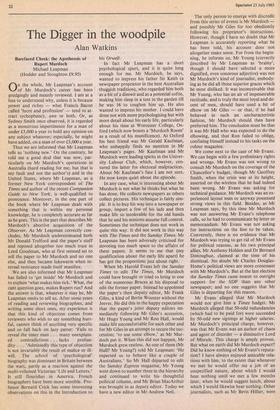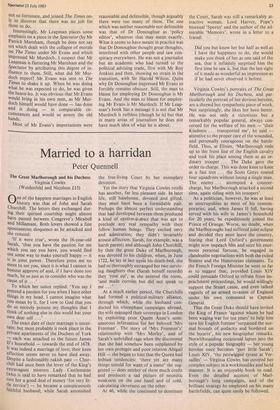The Digger in the woodpile
Alan Watkins
Barefaced Cheek: the Apotheosis of Rupert Murdoch Michael Leapman (Hodder and Stoughton £9.95)
On the whole, Mr Leapman's account of Mr Murdoch's career has been grudgingly and meanly reviewed. I am at a loss to understand why, unless it is because power and riches — what Francis Bacon called 'lucre and profession' — tend to at- tract sychophancy, awe or both. Or, as Sydney Smith once observed, it is regarded as a monstrous impertinence for a man of under £3,000 a year to hold any opinion on any subject whatever; especially, he might have added, on a man of over £3,000 a year.
Thus we are informed that Mr Leapman tells us 'nothing new.' On the contrary, he told me a good deal that was new, par- ticularly on Mr Murdoch's operations in Australia (hard reading for me, but that is my fault and not the author's) and in the United States, where Mr Leapman, as a former New York correspondent of The Times and author of the recent Companion Guide to New York, is well-qualified to pronounce. Moreover, in the one part of the book where Mr Leapman deals with something that is within my personal knowledge, he is completely accurate as far as he goes. This is the part that describes Mr Murdoch's abortive acquisition of the Observer. As Mr Leapman correctly con- cludes, Mr Murdoch underestimated both Mr Donald Trelford and the paper's staff and reposed altogether too much trust in Lord Goodman, who at first seemed set to sell the paper to Mr Murdoch and no one else, and then became lukewarm when in- ternal resistance made itself manifest.
We are also informed that Mr Leapman has failed to 'get inside' Mr Murdoch and to explain 'what makes him tick.' What, the cant question goes, makes Rupert run? And the answer is that, whatever it may be, Mr Leapman omits to tell us. After some years of reading and reviewing biographies, and writing some short ones, my experience is that this kind of objection comes from reviewers who wish to say something hurt- ful, cannot think of anything very specific and so fall back on lazy patter: 'Fails to reveal the inner man . . . many unexplain-
ed contradictions . . . lacks profun- dity . . . 'Admittedly this type of objection is not invariably the result of malice or ill- will. The school of 'psychological' biography was dominant in Britain between the wars, partly as a reaction against the multi-volumed Victorian 'Life and Letters.' It still flourishes in America. French biographers have been more sensible. Pro- fessor Bernard Crick has some interesting observations on this in the Introduction to his Orwell:
In fact Mr Leapman has a short psychological spurt, and it is quite long enough for me. Mr Murdoch, he says, wanted to impress his father Sir Keith (a newspaper proprietor in the best Australian thuggish tradition), who regarded him both as a bit of a dimwit and as a potential softie, making him sleep in a tent in the garden till he was 16 to toughen him up. He also wanted to impress his mother. I could have done not with more psychologising but with more detail about his early life, particularly about his time at Worcester College, Ox- ford (which now boasts a 'Murdoch Room' as a result of his munificence). At Oxford his best friend was Mr Gerald Kaufman, who unhappily finds no mention in Mr Leapman's pages. Mr Kaufman and Mr Murdoch were leading spirits in the Univer- sity Labour Club, which, however, cen- sured the latter for electoral malpractices. About Mr Kaufman's fate I am not sure. He now keeps quiet about the episode.
In any case, what is interesting about Mr Murdoch is not what he thinks but what he has done. He collects newspapers as others collect pictures. His technique is fairly sim- ple. It is lo buy his way into a newspaper or group, import a few of his lads and then make life so intolerable for the old hands that he and his minions assume full control. Sometimes the technique does not work in quite this way. It did not work in this way with The Times and the Sunday Times. Mr Leapman has been adversely criticised for devoting too much space to the affairs of these papers. It seems to me that (my qualification about the early life apart) he has got the proportions just about right.
When Mr Harold Evans left the Sunday Times to edit The Times, Mr Murdoch could have brought or tried to bring in one of the numerous Bruces at his disposal to edit the former paper. Instead he appointed the paper's then deputy editor, Mr Frank Giles, a kind of Bertie Wooster without the Jeeves. He did this in the happy expectation that the paper's joint deputy editors im- mediately following Mr Giles's accession, Mr Hugo Young and Mr Ron Hall, would make life uncomfortable for each other and for Mr Giles in an attempt to secure the suc- cession; 'to use. some elbow,' as Mr Mur- doch put it. When this did not happen, Mr Murdoch grew restless. As one of them (Mr Hall? Mr Young?) told Mr Leapman: 'He expected us to behave like a couple of Australians.' So Mr Hall departed to edit the Sunday Express magazine, Mr Young went down to number three in the hierarchy and continued to write his thoughtful political column, and Mr Brian MacArthur was brought in as deputy editor. Today we have a new editor in Mr Andrew Neil.
The only person to emerge with discredit from this series of events is Mr Murdoch and possibly Mr Giles for too obediently following his proprietor's instructions. However, though I have no doubt that Mr Leapman is accurately reporting what he has been told, his account does not altogether make sense. For from the begin- ning, he informs us, Mr Young (correctly described by Mr Leapman as 'brainy', though I should have selected a more dignified, even sonorous adjective) was not Mr Murdoch's kind of journalist, embody- ing as he did all those superior graces which he most disliked. It was inconceivable that Mr Young, who has an air of impenetrable rectitude, and is truly the most loyal and de- cent of men, should have used a bit of elbow on Mr Giles — or that, if he had behaved in such an uncharacteristic fashion, Mr Murdoch should then have preferred him. The conclusion must be that it was Mr Hall who was expected to do the elbowing, and that Ron failed to oblige, confining himself instead to his tasks on the colour magazine.
We come next to the case of Mr Evans. We can begin with a few preliminary rights and wrongs. Mr Evans was not wrong to consult Mr Murdoch on the coverage of the Chancellor's budget, though Mr Geoffrey Smith, when the crisis was at its height, asserted on the wireless that he had indeed been wrong. Mr Evans was asking for technical guidance. Mr Murdoch was an ex- perienced layout man or anyway possessed strong views in this field. Besides, as Mr Leapman says, by this time Mr Murdoch was not answering Mr Evans's telephone calls, so he had to communicate by letter or memorandum. Mr Evans was not asking for instructions on the line to be taken. Conversely, there is no evidence that Mr Murdoch was trying to get rid of Mr Evans for political reasons, as his two principal allies, Mr Anthony Holden and Dr Bernard Donoughue, claimed at the time of his dismissal. No doubt Mr Charles Douglas- Home's political views are more consonant with Mr Murdoch's. But at the last election the Sunday Times came nearer to outright support for the SDP than any other newspaper; and no one suggests that Mr Giles is departing for this reason.
Mr Evans alleged that Mr Murdoch would not give him a Times budget. Mr Murdoch alleged that 50-odd redundancies (which had to be paid for) were succeeded by 50-odd new signings at higher salaries. Mr Murdoch's principal charge, however, was that Mr Evans was an author of chaos and agent of disorder — a diminutive Lord of Misrule. This charge is amply proven. But what on earth did Mr Murdoch expect? Did he know nothing of Mr Evans's reputa- tion? I have always enjoyed amicable rela- tions with him, to the extent that whenever we met he would offer me a job of an unspecified nature, about which I would hear nothing until we met a few months later, when he would suggest lunch, about which I would likewise hear nothing. Other journalists, such as Mr Bevis Hillier, were not so fortunate, and joined The Times on- ly to discover that there was no job for them to do.
Interestingly, Mr Leapman places some emphasis on a piece in the Spectator (by Mr Patrick Marnham, though he does not say so) which dealt with the collapse of morale on The Times under Mr Evans and which impressed Mr Murdoch. I suspect that Mr Leapman is flattering Mr Marnham and the Spectator by attributing this degree of in- fluence to them. Still, what did Mr Mur- doch expect? Mr Evans was sent to The Times to shake it up. When he was doing what he was expected to do, he was given the heave-ho. It was obvious that Mr Evans would bring in his own men, as Mr Mur- doch himself would have done — has done and is doing — in comparable cir- cumstances and would so annoy the old hands.
Most of Mr Evans's importations were reasonable and defensible, though arguably there were too many of them. The one which was neither reasonable nor defensible was that of Dr Donoughue as 'policy editor', whatever that may mean exactly. What it seems to have meant in practice was that Dr Donoughue thought great thoughts, interfered with other people and saw con- spiracy everywhere. He was not a journalist but an academic who had turned to the political advising trade, first with Mr Roy Jenkins and then, showing no strain in the transition, with Sir Harold Wilson. Quite why Dr Donoughue impressed Mr Evans so forcibly remains obscure. Still, the man to blame for employing Dr Donoughue is Mr Evans. And the man to blame for employ- ing Mr Evans is Mr Murdoch. If Mr Leap- man's book has a message it is not that Mr Murdoch is ruthless (though he is) but that in many areas of journalism he does not have much idea of what he is about.







































 Previous page
Previous page